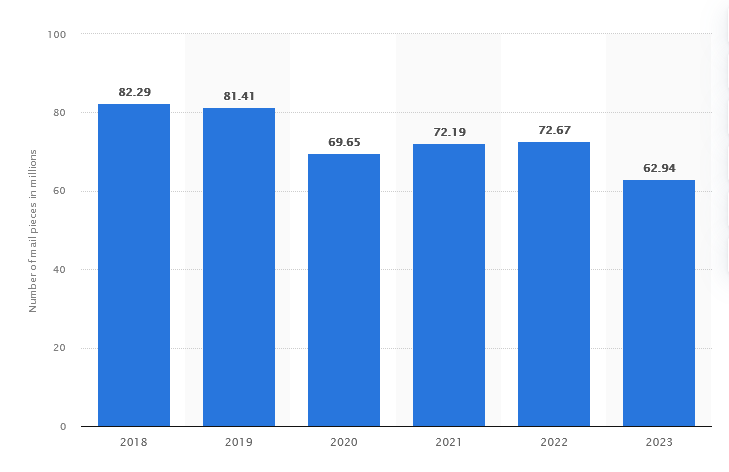Changes in print technology today are presenting print service providers with new marketing capabilities that weren't possible just a few years ago. In direct mail, this means there is opportunity for those who are willing to adapt today.
Trends in Direct Mail

On the surface, direct mail marketing seems to be anything but a hot trend. There are more laws pending, such as one in Illinois that will require direct mail to have a warning sticker that it's an advertisement.
There are also higher paper and postage costs. And direct mail volume is down by 13% in 2023.

Source: Number of Direct Mail Pieces in the US 2018-2023, (in millions) Statista
So, where's the bright spot?
There are several significant opportunities in direct mail today thanks to new technology.
Omni-Channel Integration with Digital Marketing Campaigns
The omni-channel capability of direct mail, with QR codes and augmented reality (AR), makes a brand's marketing more effective overall.
In the Future of Direct Mail White Paper from the USPS, marketers found that cross-channel campaigns increased:
• Website visits
• Response rates
• ROI
• Number of leads
• Traffic to a physical store and
• Digital downloads
Less Mailbox Competition
Lower direct mail volume also means that new direct mail campaigns will stand out even more thanks to reduced mailbox clutter.
Customization and Personalization
Digital print capability makes it easy to offer direct mail versioning and personalization without the additional costs associated with offset printing. Each piece of mail can be customized to the recipient, from addressing them by name to tailoring the content, images, and offers to their specific interests and behaviors. This level of personalization has been shown to increase engagement and response rates.
Short Print Runs and Cost Effectiveness
Unlike traditional printing, which requires large volumes to be cost-effective, digital printing is economical for small batches. This makes targeted campaigns more affordable and accessible for businesses of all sizes, allowing for specialized and test campaigns before scaling up.
You can use this direct mail calculator to help clients figure out optimum run sizes for each campaign.
Speed to Market
Digital printing significantly reduces turnaround times. Without the need for creating plates or lengthy setup processes, campaigns can move from design to print to mailing much faster. This agility is needed to respond to clients' demands for timely promotions and fast reactions to changing market conditions.
Data-Driven Decisions
The combination of digital printing and sophisticated analytics allows marketers to use data more effectively. By analyzing response rates and customer behavior, businesses can continuously refine their direct mail strategies for better results.
Sustainability
Digital printing tech has evolved regarding sustainability, with more energy-efficient printers and the use of eco-friendly inks and recyclable papers. Affordable short runs means there is no need for clients to carry wasteful, excess inventory. The lack of printing plates and near-zero make ready is another eco-friendly benefit. These features of digital printing align with the growing consumer expectation for environmentally responsible business practices.
Getting the Most from Direct Mail Growth Trends
Despite new laws and higher costs, direct mail offers new opportunities thanks to current and evolving print technology. Long-term cross-channel campaigns with personalized content increase website visits, response rates, and ROI. Affordable short runs, eco-friendly features, and speed-to-market make digitally printed direct mail appealing to more companies than ever. And better data capabilities make it easier to manage direct mail campaigns for a better ROI.
It's our job to get the message out to clients and show them how direct mail can help grow their companies.
For a quote on your latest direct mail or other printing project, call our estimating department at 559-251-8595 ext. 1. Or log in to the WTP Member Portal for an instant quote.